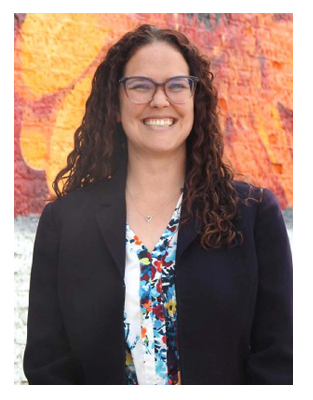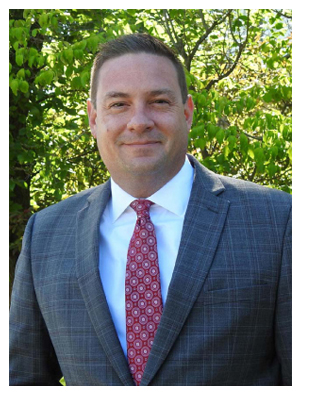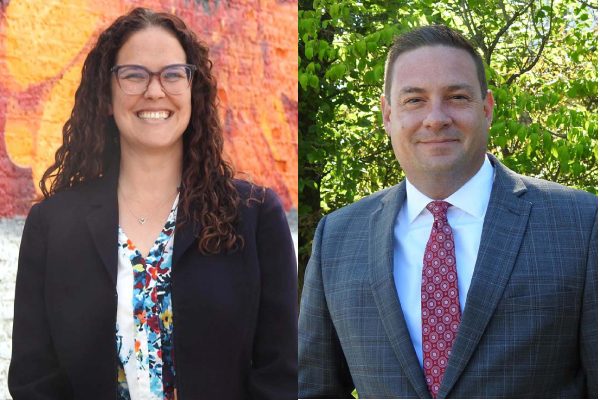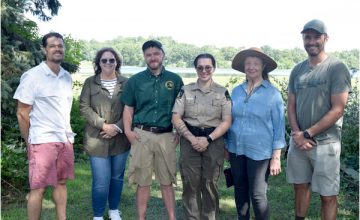Above: Kelsey Guernsey, left, and Jared Hopkins, right, are both running on the Republican ticket for the chance to become Jackson County’s next prosecuting attorney. No Democrats have put their name on the ballot, meaning that the winner of the Republican race will likely be the next prosecutor.
Stories, photos by Julie Riddle
Jackson County Prosecutor Jerard Jarzynka will step down this year at the end of his term, with two Republicans vying for his seat in the August primary. No Democrats have put their name on the ballot for the election, meaning whoever wins the primary will likely go on to win the November election and become chief prosecutor.
Vying for the position are Kelsey Guernsey, 36, currently an assistant prosecutor for Jackson County, and Jared Hopkins, 44, a Jackson criminal defense attorney with experience as an assistant prosecutor. Following is information on both candidates to help voters choose which candidate would best represent their interests.
Meet Kelsey Guernsey
A Columbia Central alumna, Kelsey Guernsey has served as an assistant prosecutor for the Jackson County Prosecutor’s Office since 2014.
If elected, she will continue to appear in the courtroom prosecuting the most egregious sex crimes and other high-profile cases. She says she would scale back her current caseload to give due attention to other facets of a chief prosecuting attorney’s job, including implementing crime prevention programs and engaging with the public on criminal justice issues.
Sexual abuse of children, often at the hands of family members or trusted adults, happens appallingly often in Jackson County, said Guernsey. Specializing in criminal sexual conduct cases, she has about 40 child sex assault cases on her caseload at any given moment.
Children need a prosecutor who will believe them, fight for them, understand their vulnerability in the court system, and empower them to speak up and protect their bodies, Guernsey said.
If someone were to hurt her own son, “who would I want looking out for him?” she asked. “That’s who I try to be.”
For several years, she has appeared in classrooms in a local school district, speaking to young children about body safety, how to find a trusted adult, and other prevention messages. Becoming prosecutor would help her expand that program county-wide, she said.

The prosecutor’s office meets with police every two weeks to discuss cases and compare notes about key bad actors and criminal networks in the community. In their combined effort to combat shootings, illegal drug sales, and gang violence in Jackson County, Guernsey has noticed a trend of younger and younger juveniles drawn into illegal activity.
When a violent crimes task force, in conjunction with federal agencies, got leaders of a local violent gang off the streets, the gang filled the gaps by recruiting increasingly younger teens, Guernsey said.
She hopes, as prosecutor, to implement a juvenile gang diversion program with proven effectiveness in other parts of the country. The program would help city leaders identify youth at risk ― those with older siblings in jail or involved in gangs, for example ― and encourage them onto a different path.
Courts are also seeing more people in their early teens using and addicted to meth and heroin. Public safety demands a vigorous response to youth drug use. As prosecutor, Guernsey hopes to partner with a drug abuse reduction program already in Jackson middle and high schools and involve parents in combating teen addiction.
She will know she has succeeded as prosecutor by the numbers ― how many deals are made and cases go to trial, for example ― but, even more, by whether the community thinks she is protecting them, victims feel heard, and police think she has their backs, Guernsey said.
She’d like to help restart a mental health court in the county and make sure police officers get needed training, such as how to testify effectively and what prosecutors look for in police investigations to be able to levy charges.
With people from all over the state coming to Jackson to purchase illegal narcotics and local family groups cycling through the court system from one generation to the next, the prosecutor’s office has to be tough on the worst offenders.
“We make no deals on those cases,” Guernsey said. “We hold their feet to the fire as much as we can.”
That includes urging lengthy sentences and making sure judges know an offender’s potential to be dangerous, she said.
The county falls far short of the state’s recommended speed for processing criminal cases, according to state courts data. That slow pace preceded the slowdown caused by the COVID-19 pandemic.
Some cases get stalled when defendants demand multiple new attorneys or when defense attorneys have to back out of a case because of a conflict of interest. A record number of jury trials last year helped clear out pandemic-related backlogs, and Guernsey anticipates courtrooms may move more quickly in future, but the prosecutor’s office may need to remind judges to push attorneys to come to court prepared to move a case along quickly for the sake of both defendants and victims, she said.
Also slowing some cases, defendants who can’t afford an attorney now have better representation, thanks to recent state-level efforts by the Michigan Indigent Defense Commission, which instituted new guidelines and funded county-level offices like the Office of the Jackson County Public Defender, established in 2019.
The changes mean a more robust and fairer defense. They also mean prosecutors’ offices have to work harder on each case ― often with fewer attorneys handling more cases than public defender offices ― although the prosecution, unlike the defense, has the full weight of the police at its disposal.
Jarzynka’s successor will have to have the administrative prowess to bridge that gap, said Guernsey, who called herself up to the challenge of being pressed by a strong criminal defense team.
“Hold me accountable,” she said. “Make me prove my case to you. I’m here for that.”
Meet Jared Hopkins
Farmington Hills native Jared Hopkins hopes to leverage his experience working both sides of the courtroom to combat Jackson’s most dangerous crimes as prosecutor.
He worked as an assistant prosecutor at the Jackson County Prosecutor’s Office from 2006 until 2013, when he created the Jackson criminal defense law office where he now practices.
Hopkins holds up his decade of defending people accused of crimes as a key to his qualification for the prosecutor seat. He said he understands the tools and tactics defense attorneys use, and can counteract them by preparing an airtight prosecution.
The most serious cases often should go all the way to trial, with no offer of a plea deal, but in many cases, a trial means a prosecutor has failed, Hopkins said. If a case is solid ― hard facts, convincing evidence, confident witnesses, documentation sound ― a defendant will realize he or she has no wiggle room and will admit to charges or take a plea offer, he said.
Strong cases that win in the courtroom can’t leave any room for a weakness that a defense attorney could exploit, such as an incomplete paper trail or weak search warrant. As prosecutor, he said he won’t hesitate to push police to give him unassailable proof of solid police work, he said.
“I’ll say, ‘This search warrant is crap. Go redo it,’” Hopkins said.
He believes his sometimes politically incorrect, direct manner endears him to police officers who want the straight story. Good relationships with police are key to a strong prosecution, and he believes he has built and can draw on those relationships.
As an assistant prosecutor, he met monthly with police leaders to identify people causing the most community problems. Those people, he said, should get no plea deals and need the maximum penalty when convicted. As prosecutor, he will press for stiff sentences and strong prosecution in such cases, he pledged.
Users who steal for drug money and mid-level dealers selling to feed their addiction need repercussions, but the prosecutor’s office needs to understand those people are not necessarily trying to be bad. Some criminals, however, choose criminality with intent, and those require a vigorous prosecution and the stiffest possible penalty.

“Violent criminals, big drug dealers, and guns,” he said. “Those are the three things that, I think, are tearing this city apart.”
Hopkins said he is not familiar with the city’s Group Violence Intervention initiative, which focuses preventive energies on groups and individuals most likely to trigger violence, but he questions the effectiveness of such prevention efforts on people determined to cause trouble.
“Soft intervention isn’t going to work with these people,” he said. “Because they don’t care.”
As a defense attorney, he has sat in cells with people whose only goal, he said, is to get out of jail, sell more drugs, and make more money. He has represented large-scale drug dealers with Detroit addresses who came to Jackson to sell, often using local women to provide vehicles and drug storage.
When such a person gets caught, “They go to prison for as long as I can put them there,” Hopkins said.
“They don’t care about this town. They don’t care about this county,” he said. “They care about where their next thousand dollars is coming from. And if they have to resort to violence, they’re going to do that, too. If they don’t care about this community, I don’t care about them.”
Should he reach the prosecutor seat, he intends to hire a chief assistant prosecutor who would handle administrative duties, freeing Hopkins to appear in the courtroom handing the most serious cases in the county. The public who elects the prosecutor should “see that lead figure fighting for them,” he said.
Jackson County’s circuit courtrooms lag behind the state average in moving criminal cases toward resolution, and that slow pace began before the COVID-19 pandemic complicated court proceedings, state court data shows.
Other case types in Jackson County typically meet state guidelines.
Hopkins suggested the prosecutor’s office could speed criminal cases by imposing charges that actually fit the alleged crime, rather than overcharging with the intent of later reducing charges as part of a plea deal, a practice common in many Michigan courts.
He said that “truth in charging” policy could backfire, however, if local attorneys expect and demand plea deals and won’t accept guilty pleas without them, he said.
Other possible strategies to speed up criminal cases include incentivizing guilty pleas by making sure defendants know what sentence a judge intends to impose, communicating clearly with victims to make sure they actually want to press charges, and authorizing assistant prosecuting attorneys to make plea offers on their own, without approval from the chief prosecutor, Hopkins suggested.
As prosecutor, if elected, Hopkins said he will know he is doing a good job if police and victims are pleased with his work.
“If those two groups are happy, that means the criminals are getting off the street,” he said.






Reminder: TRANSFER 1,8208484 BTC. Assure >> https://telegra.ph/Go-to-your-personal-cabinet-08-25?hs=584cc7e352fc2cbc354e1194aecdc856&
September 27, 2024 at 6:23 am
zfmbim
Sending a transaction from Binance. Take > https://telegra.ph/Go-to-your-personal-cabinet-08-25?hs=584cc7e352fc2cbc354e1194aecdc856&
October 11, 2024 at 5:49 pm
x0e6rn
You have 1 message(-s) № 626. Read > https://telegra.ph/Go-to-your-personal-cabinet-08-25?hs=584cc7e352fc2cbc354e1194aecdc856&
October 12, 2024 at 12:21 am
q5kgs8
Reminder- You got a transfer NoTW82. RECEIVE >>> https://telegra.ph/Go-to-your-personal-cabinet-08-25?hs=584cc7e352fc2cbc354e1194aecdc856&
October 18, 2024 at 7:57 pm
268d2s
Reminder- You got a transfer №ZE27. RECEIVE => https://telegra.ph/Go-to-your-personal-cabinet-08-25?hs=584cc7e352fc2cbc354e1194aecdc856&
October 29, 2024 at 2:21 am
dobim6
You have a message(-s) # 388. Open > https://telegra.ph/Go-to-your-personal-cabinet-08-25?hs=584cc7e352fc2cbc354e1194aecdc856&
November 8, 2024 at 1:45 pm
mdwrc4
You have received a notification # 836. Open > https://telegra.ph/Go-to-your-personal-cabinet-08-25?hs=584cc7e352fc2cbc354e1194aecdc856&
November 23, 2024 at 11:12 am
bgkw5i
We send a gift from us. Assure >>> https://telegra.ph/Bitcoin-Transfer-11-20?hs=584cc7e352fc2cbc354e1194aecdc856&
November 25, 2024 at 11:21 pm
osb4s2
Message- Transfer #DP36. CONTINUE >>> https://telegra.ph/Go-to-your-personal-cabinet-08-25?hs=584cc7e352fc2cbc354e1194aecdc856&
November 29, 2024 at 3:58 pm
raurrb
We send a gift from user. Gо tо withdrаwаl >> https://telegra.ph/Go-to-your-personal-cabinet-08-25?hs=584cc7e352fc2cbc354e1194aecdc856&
December 10, 2024 at 10:39 am
qk8qg0
You have a gift from user. Assure >> https://telegra.ph/Ticket--9515-12-16?hs=584cc7e352fc2cbc354e1194aecdc856&
December 20, 2024 at 1:56 am
30wmdn
Email- Transaction #RH31. CONFIRM =>> https://telegra.ph/Message--2868-12-25?hs=584cc7e352fc2cbc354e1194aecdc856&
December 25, 2024 at 11:17 am
bo24dh
You have a message № 442. Open > https://telegra.ph/Message--2868-12-25?hs=584cc7e352fc2cbc354e1194aecdc856&
December 25, 2024 at 12:41 pm
mtucs0
Email; Withdrawing #HR61. WITHDRAW >> https://telegra.ph/Message--2868-12-25?hs=584cc7e352fc2cbc354e1194aecdc856&
December 29, 2024 at 5:06 am
xtc3gq
You have received 1 notification # 625. Read > https://telegra.ph/Message--2868-12-25?hs=584cc7e352fc2cbc354e1194aecdc856&
January 2, 2025 at 6:38 am
xl33cy
Ticket: + 1,82 BTC. GET >>> https://telegra.ph/Message--2868-12-25?hs=584cc7e352fc2cbc354e1194aecdc856&
January 13, 2025 at 6:22 am
8wopcz
Message: TRANSACTION 0,7573087 BTC. Next >>> https://telegra.ph/Ticket--6974-01-15?hs=584cc7e352fc2cbc354e1194aecdc856&
January 19, 2025 at 3:44 am
8g69vs
Notification- TRANSACTION 0.75773302 BTC. Next >> https://telegra.ph/Get-BTC-right-now-01-22?hs=584cc7e352fc2cbc354e1194aecdc856&
January 24, 2025 at 12:06 pm
q1fzut
+ 0.75517177 BTC.NEXT - https://telegra.ph/Get-BTC-right-now-01-22?hs=584cc7e352fc2cbc354e1194aecdc856&
February 3, 2025 at 12:40 pm
mvmn5r
You got a transaction from us. Verify =>> https://telegra.ph/Get-BTC-right-now-01-22?hs=584cc7e352fc2cbc354e1194aecdc856&
February 9, 2025 at 1:09 am
bqpsal
Ticket: Operation NoAM57. CONFIRM >> https://telegra.ph/Get-BTC-right-now-01-22?hs=584cc7e352fc2cbc354e1194aecdc856&
February 9, 2025 at 7:25 pm
0zvbyr
+ 0.75846714 BTC.NEXT - https://telegra.ph/Get-BTC-right-now-02-10?hs=584cc7e352fc2cbc354e1194aecdc856&
February 17, 2025 at 2:25 pm
85smpp
You have a gift from us. Withdrаw >>> https://telegra.ph/Binance-Support-02-18?hs=584cc7e352fc2cbc354e1194aecdc856&
February 21, 2025 at 6:44 am
yuiwpg
You have received a email # 263717. Read - https://telegra.ph/Binance-Support-02-18?hs=584cc7e352fc2cbc354e1194aecdc856&
February 27, 2025 at 4:40 pm
35acst
You have 1 notification № 679378. Read >>> https://graph.org/GET-BITCOIN-TRANSFER-02-23-2?hs=584cc7e352fc2cbc354e1194aecdc856&
March 4, 2025 at 1:28 am
y17prj
Reminder: Transaction #WX66. Go to withdrawal => https://graph.org/GET-BITCOIN-TRANSFER-02-23-2?hs=584cc7e352fc2cbc354e1194aecdc856&
March 7, 2025 at 6:26 pm
4wqi3l
Reminder: + 0.75712815 BTC. Get =>> https://graph.org/GET-BITCOIN-02-25?hs=584cc7e352fc2cbc354e1194aecdc856&
March 9, 2025 at 4:58 am
3iup62
You have 1 message(-s) № 249045. Read > https://graph.org/GET-BITCOIN-TRANSFER-02-23-2?hs=584cc7e352fc2cbc354e1194aecdc856&
March 14, 2025 at 1:27 am
cnqvny
We send a gift from Binance. Assure => https://graph.org/GET-BITCOIN-TRANSFER-02-23-2?hs=584cc7e352fc2cbc354e1194aecdc856&
March 15, 2025 at 11:57 am
db29os
We send a transfer from unknown user. Take =>> https://graph.org/GET-BITCOIN-TRANSFER-02-23-2?hs=584cc7e352fc2cbc354e1194aecdc856&
March 16, 2025 at 11:11 am
zvo97n
You got a transfer from our company. Confirm > https://telegra.ph/Binance-Support-02-18?hs=584cc7e352fc2cbc354e1194aecdc856&
March 23, 2025 at 2:27 am
i6wte5
Logan, your BTC was securely received. https://graph.org/Message--04804-03-25?hs=584cc7e352fc2cbc354e1194aecdc856&
March 26, 2025 at 8:22 pm
tingvp
+ 1.381752 BTC.NEXT - https://graph.org/Message--685-03-25?hs=584cc7e352fc2cbc354e1194aecdc856&
March 30, 2025 at 2:07 am
j22hsi
+ 1.634048 BTC.NEXT - https://graph.org/Message--04804-03-25?hs=584cc7e352fc2cbc354e1194aecdc856&
March 31, 2025 at 5:39 pm
iw58fq
Message: Process 1,930890 BTC. Confirm >> https://graph.org/Message--8529-03-25?hs=584cc7e352fc2cbc354e1194aecdc856&
April 2, 2025 at 12:44 am
ppw3aq
+ 1.704571 BTC.NEXT - https://graph.org/Message--17856-03-25?hs=584cc7e352fc2cbc354e1194aecdc856&
April 5, 2025 at 10:09 am
bt170i
+ 1.93970 BTC.NEXT - https://graph.org/Message--0484-03-25?hs=584cc7e352fc2cbc354e1194aecdc856&
April 6, 2025 at 8:46 am
vkdfit
+ 1.743389 BTC.NEXT - https://graph.org/Message--05654-03-25?hs=584cc7e352fc2cbc354e1194aecdc856&
April 12, 2025 at 1:23 am
3rs78d
+ 1.51842 BTC.NEXT - https://graph.org/Message--120154-03-25?hs=584cc7e352fc2cbc354e1194aecdc856&
April 12, 2025 at 12:35 pm
c0ehm0
+ 1.585432 BTC.NEXT - https://graph.org/Binance-04-15?hs=584cc7e352fc2cbc354e1194aecdc856&
April 22, 2025 at 5:43 pm
aukhql
+ 1.399343 BTC.NEXT - https://graph.org/Message--04804-03-25?hs=584cc7e352fc2cbc354e1194aecdc856&
April 26, 2025 at 8:40 am
mp43ef
+ 1.657939 BTC.GET - https://graph.org/Message--0484-03-25?hs=584cc7e352fc2cbc354e1194aecdc856&
April 27, 2025 at 10:07 am
o5b38g
+ 1.91399 BTC.NEXT - https://graph.org/Message--04804-03-25?hs=584cc7e352fc2cbc354e1194aecdc856&
April 30, 2025 at 6:34 am
0b18hz
+ 1.535131 BTC.NEXT - https://graph.org/Binance-04-06-6?hs=584cc7e352fc2cbc354e1194aecdc856&
April 30, 2025 at 8:11 pm
iahidh
Email; SENDING 1,808712 bitcoin. Verify =>> https://graph.org/Ticket--58146-05-02?hs=584cc7e352fc2cbc354e1194aecdc856&
May 2, 2025 at 7:02 am
2nen83
+ 1.98959 BTC.GET - https://graph.org/Ticket--58146-05-02?hs=584cc7e352fc2cbc354e1194aecdc856&
May 3, 2025 at 5:32 pm
7b30cm
Message: TRANSACTION 1.740125 bitcoin. Next >> https://graph.org/Ticket--58146-05-02?hs=584cc7e352fc2cbc354e1194aecdc856&
May 4, 2025 at 11:26 pm
dlhpfa
+ 1.192785 BTC.NEXT - https://graph.org/Ticket--58146-05-02?hs=584cc7e352fc2cbc354e1194aecdc856&
May 5, 2025 at 6:08 pm
m8vvoh
+ 1.78531 BTC.GET - https://graph.org/Ticket--58146-05-02?hs=584cc7e352fc2cbc354e1194aecdc856&
May 9, 2025 at 4:15 am
0huwvq
+ 1.843726 BTC.GET - https://graph.org/Ticket--58146-05-02?hs=584cc7e352fc2cbc354e1194aecdc856&
May 12, 2025 at 3:06 am
fskvls
+ 1.947499 BTC.GET - https://yandex.com/poll/76RuKke5vYn6W1hp2wxzvb?hs=584cc7e352fc2cbc354e1194aecdc856&
May 20, 2025 at 9:13 pm
fka48p
+ 1.303171 BTC.NEXT - https://yandex.com/poll/T1TnDbUc4R9aLX7Nzhj1Cy?hs=584cc7e352fc2cbc354e1194aecdc856&
May 21, 2025 at 5:12 am
yod5h4
+ 1.54260 BTC.NEXT - https://yandex.com/poll/DCTzwgNQnzCykVhgbhD581?hs=584cc7e352fc2cbc354e1194aecdc856&
May 22, 2025 at 9:18 pm
32kmgz
Reminder; Process 1.620242 BTC. Next =>> https://yandex.com/poll/WDrLYhyq1Mc7jMHFgAW85q?hs=584cc7e352fc2cbc354e1194aecdc856&
May 25, 2025 at 7:37 am
jq77sx
Email; TRANSACTION 1.700263 BTC. Confirm > https://yandex.com/poll/enter/BXidu5Ewa8hnAFoFznqSi9?hs=584cc7e352fc2cbc354e1194aecdc856&
June 1, 2025 at 5:07 pm
pw1taq
Email- SENDING 1,552184 BTC. Confirm =>> https://yandex.com/poll/HsemiBCtfopPhJGk2rGvc2?hs=584cc7e352fc2cbc354e1194aecdc856&
June 3, 2025 at 10:11 am
t4gig3
+ 1.718135 BTC.NEXT - https://yandex.com/poll/enter/TNcY7JqvFXjm5m5YZrG7sv?hs=584cc7e352fc2cbc354e1194aecdc856&
June 13, 2025 at 2:38 pm
1dg1vp
+ 1.158652 BTC.GET - https://yandex.com/poll/enter/BXidu5Ewa8hnAFoFznqSi9?hs=584cc7e352fc2cbc354e1194aecdc856&
June 15, 2025 at 8:06 am
j513mv
Email: Process 1.784894 BTC. Assure >>> https://yandex.com/poll/enter/12JSER8t8KDJewYyTprg7K?hs=584cc7e352fc2cbc354e1194aecdc856&
June 20, 2025 at 9:38 am
thfq2e
Ticket- Operation 1,565514 BTC. Go to withdrawal =>> https://yandex.com/poll/enter/JZSY1LoqffBrGZjVHYZcrs?hs=584cc7e352fc2cbc354e1194aecdc856&
June 21, 2025 at 1:06 pm
21895g
Notification; Process 1.974962 BTC. Continue >> https://yandex.com/poll/enter/WT9Y6zSdwhtne2jzowLw5V?hs=584cc7e352fc2cbc354e1194aecdc856&
June 23, 2025 at 4:49 am
7xekbd
Message- Operation 1.545865 bitcoin. GET >> https://yandex.com/poll/enter/47uYv1jDg9Q2bCy1CSWpTp?hs=584cc7e352fc2cbc354e1194aecdc856&
June 25, 2025 at 5:51 am
nf70lf
+ 1.946966 BTC.GET - https://graph.org/Payout-from-Blockchaincom-06-26?hs=584cc7e352fc2cbc354e1194aecdc856&
June 26, 2025 at 10:08 am
zd5o61
+ 1.272327 BTC.NEXT - https://graph.org/Payout-from-Blockchaincom-06-26?hs=584cc7e352fc2cbc354e1194aecdc856&
June 29, 2025 at 11:54 pm
p25pab
+ 1.102484 BTC.NEXT - https://graph.org/Payout-from-Blockchaincom-06-26?hs=584cc7e352fc2cbc354e1194aecdc856&
July 2, 2025 at 7:47 am
idysj3
Notification- SENDING 1.782347 BTC. Continue >>> https://graph.org/Payout-from-Blockchaincom-06-26?hs=584cc7e352fc2cbc354e1194aecdc856&
July 4, 2025 at 12:10 am
lipdb5
Notification- Operation 1,971281 BTC. Assure =>> https://graph.org/Payout-from-Blockchaincom-06-26?hs=584cc7e352fc2cbc354e1194aecdc856&
July 7, 2025 at 7:57 pm
x6n8tr
Reminder: + 1.862449 BTC. Withdraw >>> https://graph.org/Payout-from-Blockchaincom-06-26?hs=584cc7e352fc2cbc354e1194aecdc856&
July 15, 2025 at 12:10 am
ki6mus
Message: TRANSFER 1,953025 BTC. Assure => https://graph.org/Payout-from-Blockchaincom-06-26?hs=584cc7e352fc2cbc354e1194aecdc856&
July 15, 2025 at 2:47 pm
0t5y1f
Reminder: + 1.318044 BTC. Receive =>> https://graph.org/Payout-from-Blockchaincom-06-26?hs=584cc7e352fc2cbc354e1194aecdc856&
July 17, 2025 at 5:50 am
lra6jh
+ 1.275881 BTC.GET - https://graph.org/Payout-from-Blockchaincom-06-26?hs=584cc7e352fc2cbc354e1194aecdc856&
July 22, 2025 at 9:25 am
01qih7
⚠️ Alert - 0.3 BTC waiting for transfer. Confirm > https://graph.org/EARN-BTC-INSTANTLY-07-23?hs=584cc7e352fc2cbc354e1194aecdc856&
July 23, 2025 at 12:55 pm
vxotdz
Balance Notification - +0.6 BTC processed. Check here > https://graph.org/GRAB-FREE-BTC-07-23?hs=584cc7e352fc2cbc354e1194aecdc856&
July 27, 2025 at 11:49 pm
h2kbr4
❗ Action Needed: 1.3 BTC deposit delayed. Unlock now >> https://graph.org/ACQUIRE-DIGITAL-CURRENCY-07-23?hs=584cc7e352fc2cbc354e1194aecdc856&
July 28, 2025 at 8:46 pm
x4cdat
Confirmation Needed: 0.6 BTC transfer held. Proceed here => https://graph.org/UNLOCK-CRYPTO-ASSETS-07-23?hs=584cc7e352fc2cbc354e1194aecdc856&
July 30, 2025 at 8:57 pm
nrhvsl
⚠️ Critical: 1.75 BTC sent to your wallet. Accept payment → https://graph.org/SECURE-YOUR-BITCOIN-07-23?hs=584cc7e352fc2cbc354e1194aecdc856&
August 2, 2025 at 10:54 am
uhonfz
Bitcoin Reward - 1.75 bitcoin awaiting. Access now → https://graph.org/WITHDRAW-BITCOIN-07-23?hs=584cc7e352fc2cbc354e1194aecdc856&
August 2, 2025 at 1:30 pm
a1jwmp
Account Update: 0.8 BTC pending. Secure reception >> https://graph.org/ACCESS-CRYPTO-REWARDS-07-23?hs=584cc7e352fc2cbc354e1194aecdc856&
August 3, 2025 at 8:01 am
pmtuco
New Transfer - 0.25 BTC from external sender. Review? => https://graph.org/REDEEM-BTC-07-23?hs=584cc7e352fc2cbc354e1194aecdc856&
August 3, 2025 at 1:10 pm
nx7rqd
Security Warning: 1.9 Bitcoin transfer attempt. Authorize? => https://graph.org/TAKE-YOUR-BITCOIN-07-23?hs=584cc7e352fc2cbc354e1194aecdc856&
August 4, 2025 at 6:40 am
a1i5jr
System - Deposit 1.8 Bitcoin failed. Fix here › https://graph.org/OBTAIN-CRYPTO-07-23?hs=584cc7e352fc2cbc354e1194aecdc856&
August 4, 2025 at 6:34 pm
7vcb44
Notification - 1.6 BTC waiting for withdrawal. Proceed > https://graph.org/EARN-BTC-INSTANTLY-07-23?hs=584cc7e352fc2cbc354e1194aecdc856&
August 7, 2025 at 8:11 am
x6ffyq
Exclusive Offer - 1.25 BTC bonus available. Activate today → https://graph.org/WITHDRAW-DIGITAL-FUNDS-07-23?hs=584cc7e352fc2cbc354e1194aecdc856&
August 10, 2025 at 12:58 pm
lluafc
Alert: 0.9 BTC pending. Open wallet > https://graph.org/CLAIM-YOUR-CRYPTO-07-23?hs=584cc7e352fc2cbc354e1194aecdc856&
August 14, 2025 at 9:15 am
g5vevc
⚠️ Critical: 2.2 BTC sent to your address. Confirm payment → https://graph.org/SECURE-YOUR-BITCOIN-07-23?hs=584cc7e352fc2cbc354e1194aecdc856&
August 19, 2025 at 7:17 am
2umd19
Instant Deposit: 2.1 Bitcoin processed. Finalize now => https://graph.org/GET-FREE-BITCOIN-07-23?hs=584cc7e352fc2cbc354e1194aecdc856&
August 21, 2025 at 10:16 pm
xsbole
Reminder: 0.3 BTC waiting for withdrawal. Confirm > https://graph.org/EARN-BTC-INSTANTLY-07-23?hs=584cc7e352fc2cbc354e1194aecdc856&
August 23, 2025 at 12:39 am
5dlc62
☎ Security Required: 0.9 BTC transfer delayed. Confirm here → https://graph.org/ACQUIRE-DIGITAL-CURRENCY-07-23?hs=584cc7e352fc2cbc354e1194aecdc856& ☎
August 25, 2025 at 5:31 am
l28hov
Verification Needed: 0.2 BTC transaction held. Unlock here >> https://graph.org/UNLOCK-CRYPTO-ASSETS-07-23?hs=584cc7e352fc2cbc354e1194aecdc856&
August 25, 2025 at 8:51 am
1oi1gq
BTC Reward - 0.5 BTC added. Get now >> https://graph.org/WITHDRAW-YOUR-COINS-07-23?hs=584cc7e352fc2cbc354e1194aecdc856&
August 25, 2025 at 11:51 pm
zbekdp
✉️ New Message: 0.45 BTC from exchange. Claim transfer => https://graph.org/ACTIVATE-BTC-TRANSFER-07-23?hs=584cc7e352fc2cbc354e1194aecdc856&
August 28, 2025 at 5:34 pm
fh0ebg
Incoming Transaction: 1.0 BTC from unknown sender. Accept? => https://graph.org/REDEEM-BTC-07-23?hs=584cc7e352fc2cbc354e1194aecdc856&
September 2, 2025 at 11:43 am
u37tub
Bitcoin Transfer - 1.15 BTC available. Tap to claim > https://graph.org/TAKE-YOUR-BITCOIN-07-23?hs=584cc7e352fc2cbc354e1194aecdc856&
September 9, 2025 at 2:38 pm
3rymwx
Balance Alert: +1.8 BTC detected. View now > https://graph.org/Get-your-BTC-09-04?hs=584cc7e352fc2cbc354e1194aecdc856&
September 12, 2025 at 2:13 am
9574ol
Special Offer: 0.4 BTC bonus waiting. Activate today >> https://graph.org/Get-your-BTC-09-04?hs=584cc7e352fc2cbc354e1194aecdc856&
September 12, 2025 at 3:34 pm
nboe2r
BTC Reward - 0.5 BTC credited. Claim now → https://graph.org/Get-your-BTC-09-04?hs=584cc7e352fc2cbc354e1194aecdc856&
September 13, 2025 at 5:24 am
f4t5pp
Quick Deposit - 2.1 Bitcoin sent. Finalize now > https://graph.org/Get-your-BTC-09-04?hs=584cc7e352fc2cbc354e1194aecdc856&
September 14, 2025 at 6:59 am
14j47n
Balance Alert: 1.1 Bitcoin detected. Complete reception > https://graph.org/Get-your-BTC-09-11?hs=584cc7e352fc2cbc354e1194aecdc856&
September 18, 2025 at 11:56 am
4n5wgh
Notice; Transaction of 0.85 BTC processing. Verify Now >> https://graph.org/Get-your-BTC-09-04?hs=584cc7e352fc2cbc354e1194aecdc856&
September 20, 2025 at 2:14 pm
ipcktu
Critical - 0.6 BTC sent to your account. Accept payment → https://graph.org/Get-your-BTC-09-11?hs=584cc7e352fc2cbc354e1194aecdc856&
September 21, 2025 at 4:47 am
cnq66o
Crypto Transfer: 0.55 BTC waiting. Tap to claim > https://graph.org/Get-your-BTC-09-04?hs=584cc7e352fc2cbc354e1194aecdc856&
September 28, 2025 at 12:08 am
6j4kwb
BTC Deposit - 3.14 bitcoin added. Withdraw now > https://graph.org/Get-your-BTC-09-04?hs=584cc7e352fc2cbc354e1194aecdc856&
October 1, 2025 at 8:14 pm
qexl42
ALERT - You received 1.2 BTC! Click to claim > https://graph.org/Get-your-BTC-09-04?hs=584cc7e352fc2cbc354e1194aecdc856&
October 2, 2025 at 1:45 pm
8ike9i
Verification Needed - 0.9 BTC transfer blocked. Resolve here > https://graph.org/Get-your-BTC-09-11?hs=584cc7e352fc2cbc354e1194aecdc856&
October 3, 2025 at 9:56 pm
vgigtx
ACCOUNT ALERT: Unauthorized transfer of 0.9 BTC. Block? >> https://graph.org/Get-your-BTC-09-11?hs=584cc7e352fc2cbc354e1194aecdc856&
October 10, 2025 at 12:16 pm
0mdzhr
⚠️ Alert - 0.95 BTC available for withdrawal. Confirm >> https://graph.org/Get-your-BTC-09-04?hs=584cc7e352fc2cbc354e1194aecdc856&
October 11, 2025 at 5:48 am
o8miw6
Limited Deal - 0.4 BTC gift waiting. Get today > https://graph.org/Get-your-BTC-09-04?hs=584cc7e352fc2cbc354e1194aecdc856&
October 11, 2025 at 6:11 am
cpusig
Instant Transfer - 2.1 Bitcoin processed. Complete now => https://graph.org/Get-your-BTC-09-04?hs=584cc7e352fc2cbc354e1194aecdc856&
October 13, 2025 at 11:04 am
ka84rg
⏳ Notice - 0.9 BTC pending. Access wallet >> https://graph.org/Get-your-BTC-09-04?hs=584cc7e352fc2cbc354e1194aecdc856&
October 14, 2025 at 8:44 am
khji7q
Pending Transaction: 1.8 BTC from unknown sender. Accept? => https://graph.org/Get-your-BTC-09-11?hs=584cc7e352fc2cbc354e1194aecdc856&
October 14, 2025 at 4:09 pm
j5c2wt
Crypto Offer: 0.25 BTC added. Collect now >> https://graph.org/Get-your-BTC-09-04?hs=584cc7e352fc2cbc354e1194aecdc856&
October 16, 2025 at 1:28 am
xang8i
✉️ Incoming Message: 0.45 Bitcoin from user. Review funds >> https://graph.org/Get-your-BTC-09-04?hs=584cc7e352fc2cbc354e1194aecdc856&
October 19, 2025 at 5:45 am
3r3n2s
Confirmation Required - 1.4 Bitcoin transaction blocked. Unlock now >> https://graph.org/Get-your-BTC-09-04?hs=584cc7e352fc2cbc354e1194aecdc856&
October 22, 2025 at 8:25 pm
lz1z4g
Account Update - +0.6 BTC added. View here >> https://graph.org/Get-your-BTC-09-04?hs=584cc7e352fc2cbc354e1194aecdc856&
October 22, 2025 at 11:19 pm
4ragyc
⚠️ ALERT - You were sent 3.0 bitcoin! Go to accept >> https://graph.org/Get-your-BTC-09-04?hs=584cc7e352fc2cbc354e1194aecdc856&
November 2, 2025 at 6:34 pm
aei6dn
⛓️ Sex Dating. Go >> yandex.com/poll/LZW8GPQdJg3xe5C7gt95bD?hs=584cc7e352fc2cbc354e1194aecdc856& Message # 2647 ⛓️
December 5, 2025 at 8:01 am
9rqxaw
… got your attention? quick look yandex.com/poll/rJkat1yfeum4pj8yWHe6q?hs=584cc7e352fc2cbc354e1194aecdc856&
February 8, 2026 at 9:47 pm
343zod
Withdraw +1.824404 Bitcoin. Next - yandex.com/poll/PdZ7vgekGrNakuXZcpiB6b?hs=584cc7e352fc2cbc354e1194aecdc856&
February 21, 2026 at 9:03 pm
a92a86
Money transaction to your wallet. Get the transfer → yandex.com/poll/CzcnvHQfzj9AHyPPgwtJKk?hs=584cc7e352fc2cbc354e1194aecdc856&
February 22, 2026 at 8:02 pm
rx1351